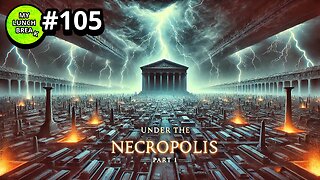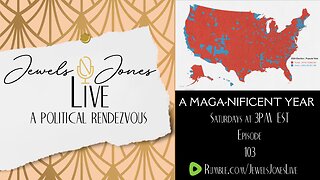Premium Only Content

Open Your Mind Wow... So Old Sayings Do Truly Have Meaning And An True Origin Story
This Channel Want You To Open Your Mind Today Wow... Old sayings, often passed down through generations, can be both intriguing and mysterious. The phrase “Open Your Mind” is a common idiom that encourages one to be receptive and open to new ideas. Interestingly Have you ever wondered where old sayings like ‘turn a blind eye to’ or ‘burning the midnight oil’ come from? Some of the following sayings have a really sinister origin, and others are completely surprising.
36 Popular Old Sayings and Their Real Meanings.
#01 “At the Drop of a Hat”
Means: To do something without delay
Real meaning: In the 19th century, a hat was used to indicate the start of a race or a fight. A hat would be dropped or swept in a downward arc and participants would begin.
#02 “As Mad as a Hatter”
Means: To be crazy or insane
Real meaning: In the 17th and 18th centuries, hatters made felt hats with mercury, which lead to all kinds of side effects, including insanity. The Mad Hatter, from Lewis Carroll’s Alice in Wonderland, is based on this phenomenon.
#03 “Barking up the Wrong Tree”
Means: Take the wrong approach or waste your efforts
Real meaning: This is an old saying that originates in America and refers to hunting dogs in the early 19th century. Hunted prey such as raccoons or bears would escape the dogs by climbing up trees. The dogs would then sit and bark at the base of the tree, waiting for their masters.
However, sometimes the dogs would lose the scent and select the wrong tree. They would still bark for their masters.
#04 “Basket Case”
Means: Stressed out, unable to cope
Real meaning: In WW1, tragically many soldiers lost limbs and had to be carried. They were put in a makeshift basket and referred to as ‘basket cases’.
#05 “Big Wig”
Means: A very important person
Real meaning: This is one of those old sayings that is literal in origin. In the 18th century, the important figures within the political system would wear the biggest wigs.
#06 “Bite the Bullet”
Means: Go through the pain and get on with it
Real meaning: There was no such thing as pain relief or anesthesia in the 19th century. As a result, when soldiers were injured on the battlefield and needed treatment, they were given a bullet to bite down on to prevent them screaming out loud.
#07 “Burning the Midnight Oil”
Means: Working late into the night
Real meaning: Before the days of electricity, oil lamps were used for lighting a room. Hence, you were burning oil at midnight if you were working late.
#08 “Bury the Hatchet”
Means: End a disagreement and move on
Real meaning: This old saying comes from a Native American tradition. When tribes declared a truce from battle, the chief from each opposing side would take a hatchet and bury it during a ceremony.
#09 “Caught Red-Handed”
Means: Apprehended during the commission of a crime
Real meaning: In 15th century Scotland, being caught red-handed refers to committing a crime that leaves you with blood on your hands.
#10 “Chow Down”
Means: To get on with eating
Real meaning: The US military came up with this slang term during WWII. The Chinese were rumored to eat dog meat and as a Chow is a Chinese dog the term grew from those two things.
#11 “Dead Ringer”
Means: An exact likeness
Real meaning: In the 19th century, US horse-racers would substitute a horse that was faster or slower than the original racing horse to con the bookies. That horse looked exactly like the substituted horse and was called a ringer.
#12 “Dressed to the Nines”
Means: Wearing your best clothes
Real meaning: There were no ‘off the shelf’ suits in the 18th century. If you wanted one, you had it made especially for you. In those days, a suit included the waistcoat and so it took nine yards of fabric to complete.
#13 “Eating Humble Pie”
Means: To be submissive or apologetic
Real meaning: As far back as the 17th century, the lord of an estate would give the ambles (the less tasty parts of an animal) to his servants. Typically, they were made into a pie. This became associated with a lower social status.
#14 “Feeling under the Weather”
Means: Not feeling well
Real meaning: This is another one of those old sayings that come from the sea. Sailors would rest under the bow of a ship if they became seasick during a voyage. This was the best place as it would protect the sailor from bad weather. Those who were ill were described as ‘being under the weather’.
#15 “Give a Cold Shoulder”
Means: Ignore or reject
Real meaning: At medieval banquets, the host would give his guests a cut of cold meat, usually the shoulder, to indicate the feast was over and it was time to go home.
#16 “Happy as Larry”
Means: As happy as you can be
Real meaning: In the late 19th century, Australian boxer Larry Foley won a massive prize pot of $150,000. The headlines the next day reported on Happy Larry.
#17 “Can’t Hold a Candle to”
Means: You are nowhere near as good as
Real meaning: In the 17th century, it was the job of the apprentices to hold the candles during the night so that their teachers or the talent could see what they were doing.
#18 “In the Limelight”
Means: To be the center of attention
Real meaning: In the 19th century, theatres used a limelight, a bright white spotlight, to light up the actors. In the limelight became known as being the center of attention.
#19 “Honeymoon”
Means: The holiday immediately after a newly-wed couple’s marriage.
Real meaning: It was a tradition for just-married couples to drink honey for a month to increase their chances of good luck throughout the marriage.
#20 “In the Nick of Time”
Means: An action performed before it is too late
Real meaning: There are lots of old sayings that relate to money and debt. This one originated in the 18th century. People kept track of the money they owed to creditors with a stick. A nick was carved onto this stick every day the money was overdue. If you paid before the nick, then you didn’t owe interest on the debt.
#21 “Kick the Bucket”
Means: To die
Real meaning: During the slaughter of cows, buckets were placed under the animal to catch the blood. Often the cow would kick the bucket at the last minute as it was being hoisted up for slaughter.
#22 “My Ears Are Burning”
Means: Someone is talking about me behind my back
power of misfits book banner mobile
Real meaning: The Ancient Romans paid particular attention to bodily sensations. They believed they were signs of good or bad luck, depending on where these sensations occurred. The left-hand side was associated with bad luck and the right side was good luck. Burning in the left ear indicated criticism whereas burning in the right ear was associated with praise.
#23 “One for the Road”
Means: The last drink before setting off
Real meaning: This old saying dates back to the Middle Ages. Apparently, prisoners on their way to execution in London were allowed to stop along Oxford Street for one final drink before they died.
#24 “Paint the Town Red”
Means: Go out for a wild night
Real meaning: There are several explanations for this old saying, but it is generally attributed to a night of drunken antics in 1837 by the Marquis of Waterford.
According to the records, the Marquis was a known drunk and renowned for his drunken rampages in the small English town of Melton Mowbray. On this particular night, however, the marquis and his friends went wild, vandalizing houses and eventually painting the doors and a statue with red paint.
#25 “Pulling Out All the Stops”
Means: Making a huge effort
Real meaning: In the late 19th century, organists used stops to create volume whenever they played. Pulling out all the stops is the loudest an organ can play.
#26 “Put a Sock in It”
Means: Be quiet and stop talking
Real meaning: Talking of volume and sound, here we have yet another one of those old sayings from the late 19th century. Gramophones used to have large trumpet-shaped horns which provided the sound. However, there was no way to adjust the volume in those days so the only way to lower the sound was to literally put a sock in the horn.
#27 “Resting on Your Laurels”
Means: To sit back and rely on past achievements
Real meaning: In Ancient Greece, laurel leaves were associated with high status and achievement. As a matter of fact, athletes were presented with wreaths made from laurel leaves to denote their prestige.
Later on, the Romans also implemented this practice and awarded laurel crowns to successful generals. They were known as ‘laureates’ and allowed to retire because of their past achievements. In other words, they could ‘rest on their laurels’. Nowadays it has more of a negative connotation.
#28 “Sell You Down the River”
Means: A betrayal of trust
Real meaning: During the abolition of the slave trade of the 19th century, southern states in the US would continue to capture and sell slaves. These slaves would be shipped down the Mississippi River and sold.
#29 “Show Your True Colours”
Means: Divulge your true intentions
Real meaning: ‘Colours’ refer to a ship’s flags and, therefore, their identity. In the 18th century, pirate ships would deliberately lower their colours or display false colours to confuse other ships into thinking they were friendly. It was only when they got close enough to attack they would show their true colours.
#30 “Sleep Tight”
Means: have a good night’s sleep
Real meaning: this is just one of the many old sayings that derive from Shakespeare’s era. In those days, beds and mattresses were secured with ropes that were pulled tight. This formed a solid base and led to a night of good sleep. Hence – sleep tight.
#31 “You Son of a Gun”
Means: A term of endearment
Real meaning: When sailors took their wives to sea on long voyages inevitably some of the women fell pregnant. The safest place to give birth was deemed to be between the gun cannons. Therefore, a child born on the gun deck was known as a ‘son of a gun’.
#32 “Spill the Beans”
Means: Tell me your secret
Real meaning: Back to Ancient Greece again for this old saying. During elections, voters would place a bean into a jar designated to the candidate of their choice. Sometimes the jar would be knocked over and the beans would spill out, revealing the result of the voting.
#33 “Steal Your Thunder”
Means: Take the limelight away from someone
Real meaning: As old sayings go, this one is the most literal I can find. 18th-century playwright John Dennis wanted an authentic sound of thunder to give his play more gravitas. So he invented a thunder-making machine.
When his play flopped he thought nothing of it, but later on, he learned that someone had looked at his machine and made a similar one for their play. It was practically the same but he was not credited with the invention. This person had literally stolen his thunder.
#34 “Turn a Blind Eye”
Means: Refusing to accept the situation
Real meaning: Naval commander Horatio Nelson is a hero in British history, but even he had his foibles. During one particular battle, his ships were sent to battle a huge combined fleet from Norway and Denmark. When an officer suggested that they withdraw, according to legend, Nelson held the telescope up to his blind eye and said:
“I really do not see the signal.”
#35 “Walls Have Ears”
Means: Watch what you say, someone could be listening
Real meaning: I’m not sure whether this is one of those old sayings born from myth but the story is interesting enough. It is said that there are underground chambers built into the Louvre Palace in Paris. In fact, Catherine de Medici had them built specifically for listening to plots against her family.
#36 “Winning Hands Down”
Means: Wins by a huge margin
Real meaning: In horse racing, a jockey uses a whip to make his or her horse gallop faster. If they are miles away from the competition, then they can put their hands down as they don’t need the whip.
Final Thoughts
These are just a few of many old sayings that have become popular over time. Do you have any to add to the list?
So You Want More Saying To Learn ? O.K. Here More History Behind These 66 Commonly Used Old Sayings. What distinguishes idioms from other common phrases and old-time sayings is that their meanings typically can't be understood through literal interpretation. For example, imagine you’re learning a new language and hear someone saying, “It’s raining cats or dogs,” or telling you to “break a leg,” this would be very confusing! And on top of it all, even if you ask a native speaker what that phrase means, they might not be able to explain it to you. That’s because rarely does somebody know the origin story of a popular saying.
Here at Bored Panda, we went the extra mile to find out the origins of the most popular idioms. From the most common idiom examples, such as “kick the bucket” and “bite the bullet,” to more obscure ones, we’ve gathered the English expressions with known roots, though sometimes the origin story comes from different sources, thus making it harder to determine which one’s the right one. Nevertheless, the stories behind these funny idioms are highly entertaining.
Didn’t think learning a new language could be fun? Buckle up because we’re about to dive deep into the history of languages to find out the incredible origins of commonly used phrases all around the world!
Top 66 Old Sayings and Their Meanings Today. Yes Some old sayings and their meanings got more attention than others. Below is a selected the top 66 sayings we liked the most.
#1 Cat Got Your Tongue
Cat sitting on sofa
Meaning: Said to someone who remains silent when they are expected to speak.
Origin: There are two stories on how this saying came into being. The first one says that it could have come from a whip called “Cat-o’-nine-tails” that was used by the English Navy for flogging and often left the victims speechless. The second one may be from ancient Egypt, where liars’ tongues were cut out as punishment and fed to the cats.
#2 The Walls Have Ears
Statue imitating listen to wall
Meaning: Be careful what you say as people may be eavesdropping.
Origin: The face Louvre Palace in France was believed to have a network of listening tubes so that it would be possible to hear everything that was said in different rooms. People say that this is how the Queen Catherine de’Medici discovered political secrets and plots.
#3 Bury The Hatchet
Image of axe stucked in firewood
Meaning: End a quarrel or conflict and become friendly.
Origin: During negotiations between Puritans and Native Americans men would bury all of their weapons, making them inaccessible.
#4 Cold Feet
Bare feet on snow
Meaning: Loss of nerve or confidence.
Origin: This idiom originates from a military term, warriors who had frozen feet were not able to rush into battle.
#5 Big Wig
Portrait of a Gentleman
Meaning: An important person, especially in a particular sphere
Origin: Back in the 18th century, the most important political figures would wear the biggest wigs, hence today influential people are called big wigs.
#6 Caught Red-Handed
Scanned hand
Meaning: Used to indicate that a person has been discovered in or just after the act of doing something wrong or illegal.
Origin: There was an old law stating that if someone butchered an animal that didn’t belong to him, he would only be punished if he was caught with blood on his hands. If one was caught with the meat but his hands were clean, he would not be punished.
#7 Raining Cats And Dogs
Painting of raining cats and dogs
Meaning: Rain very hard.
Origin: This idiom has two stories that try to explain its origin. The first explanation says that the origin of this phrase comes from Norse mythology, where cats would symbolise heavy rains and dogs were associated with the God of storms, Odin. The second version says that in 16th century England, houses had thatched roofs which were one of the few places where animals were able to get warm. Sometimes, when it would start to rain heavily, roofs would get slippery and cats and dogs would fall off, making it look like it’s raining cats and dogs!
#8 Blood Is Thicker Than Water
Hands of adult and child
Meaning: Family relationships and loyalties are the strongest and most important ones.
Origin: Even though many might think this saying means that we should put family ahead of friends, it actually meant the complete opposite. The full phrase actually was “The blood of the covenant is thicker than the water of the womb,” and it referred to warriors who shared the blood they shed in battles together. These ‘blood brothers’ were said to have stronger bonds than biological brothers.
#9 Don't Look A Gift Horse In The Mouth
Image of horse with mouth opened
Meaning: Find fault with something that has been received as a gift or favor.
Origin: While buying a horse, people would determine the horse’s age and condition based on its teeth, and then decide whether they want to buy it or not. This is the reason why people use this idiom to say it is rude to look for flaws in a thing that was given to you as a gift.
#10 Barking Up The Wrong Tree
Dog looking at tree
Meaning: Be pursuing a mistaken or misguided line of thought or course of action.
Origin: This phrase refers to hunting dogs who chase their prey up a tree. Once it climbed the tree the dogs bark at them, yet sometimes the dogs would continue barking even if the prey was no longer there.
Is the top 10 not enough for you? Well, there are more common English sayings you can read up on. While they might not be at the top, you shouldn’t write off the rest. While they might be old and dated, the origins of common sayings are still relevant today. Let’s go ahead and explore them!
#11 Turn A Blind Eye
Man covering his left eye with a hand
Meaning: Pretend not to notice.
Origin: It is believed that this phrase originates with naval hero Horatio Nelson, who used his blind eye to look through his telescope. This way he was able to avoid signals from his superior, who wanted him to withdraw from battle. He attacked, nevertheless, and was victorious.
#12 Bite The Bullet
Image of bullets
Meaning: Decide to do something difficult or unpleasant that one has been putting off or hesitating over.
Origin: During battles there was no time to administer anesthesias while performing surgeries. Because of that, patients were made to bite down on bullets to distract themselves from the pain.
#13 One For The Road
People celebrating something and raising glasses
Meaning: A final drink before leaving a place.
Origin: During the middle ages, the condemned ones were taken through what today is known as Oxford Street to their execution. During this final trip, the cart would stop and they would be allowed to have one final drink before their death.
#14 Honeymoon
Couple laying on the beach
Meaning: A holiday spent together by a newly married couple.
Origin: According to tradition, a newly wed couple would have to drink a beverage with honey for an entire month for fertility and good luck.
#15 White Elephant
White Elephant sculpture
Meaning: A possession that is useless or troublesome, especially one that is expensive to maintain or difficult to dispose of.
Origin: White elephants were considered to be sacred creatures in Thailand, yet they were also very hard to take care of. It is believed that Siamese kinds (now Thailand) would gift white elephants as a subtle form of punishment, since taking care of this animal would drive the recipient into financial ruin.
#16 Break A Leg
Image of La Monnaie De Munt
Meaning: Good luck!
Origin: It is believed that the phrase dates to World War I Germany and a saying used by German actors “Hals- und Beinbruch” which translates to “a broken neck and a broken leg.” Besides that, it still doesn’t make sense why would you wish someone to break a leg? Well, as it turns out, popular folklore down through the ages encouraged people to wish others bad luck since it was believed that wishing someone good luck would tempt evil spirits. So, you guessed it, people started wishing each other to break a leg in order for them not to break one!
#17 Give The Cold Shoulder
Black and white picture of mad man
Meaning: Reject or be deliberately unfriendly to.
Origin: This saying, that is currently considered to describe someone rude, was actually considered an act of politeness. During medieval times in England, after everyone was done feasting, the host would give his guests a cold piece of meat from the shoulder of beef or pork as a way of showing that it was time for everyone to leave.
#18 Riding Shotgun
Women doing selfie on the front mirror of the car
Meaning: Used to claim the right to sit in the front passenger seat of a vehicle on a particular journey.
Origin: This expression refers to the passenger of an old fashioned stagecoach, who sat next to the driver with a shotgun to protect from attackers and robbers along the way. There is no evidence to suggest the expression was actually used in times of the ‘Wild West,’ but most likely came about much later on, when media and films began to romanticize the period.
#19 Crocodile Tears
Eye of crocodile
Meaning: Tears or expressions of sorrow that are insincere.
Origin: Written in the 14th century, a book called “The Travels of Sir John Mandeville” recounts a knight’s adventures through Asia. In the book it says that crocodiles shed tears while eating a man they captured. Even though it is factually inaccurate, the phrase ‘crocodile tears’ found its way into Shakespeare’s work and became an idiom in the 16th century, symbolizing insincere grief.
#20 Kick The Bucket
Green bucket for milk
Meaning: To die.
Origin: When killing a cow at slaughterhouses, people would place a bucket under the animal while it was positioned on a pulley. While trying to adjust the animal, the cow would kick out its legs and therefore kick the bucket before being killed.
#21 Show Your True Colors
Image of ship sail
Meaning: Reveal one's real character or intentions, especially when these are disreputable or dishonorable.
Origin: To confuse their enemies, warships would use multiple flags. However warfare rules dictated that the ships must show its actual flag before firing and hence, the ships would then display its true colors.
#22 Close But No Cigar
Man smoking cigar
Meaning: Almost but not quite successful.
Origin: In the late 19th century carnival games were targeted to adults and not children, so the winners would get a cigar as a prize instead of stuffed animals. If the person was close to winning but did not succeed they’d say it was ‘close but no cigar’.
#23 Waking Up On The Wrong Side Of The Bed
Black and white image of sleeping woman
Meaning: Start the day in a bad temper.
Origin: Throughout history the left side of basically anything was considered to be ‘the evil side,’ so waking up on the left side was also considered a sign of bad luck. To ward off evil, house owners would push the left sides of the beds to the corner, so their guests would have no other option than to get up on the right side.
#24 Butter Someone Up
Image of butter on table
Meaning: Flatter or otherwise ingratiate oneself with someone.
Origin: The people ancient India used to throw balls of clarified butter at the statues of gods in order to seek a favor.
#25 Put A Sock In It
Vintage style card
Meaning: Stop talking.
Origin: In the late 19th century people would use woollen socks to stuff the horns of their gramophones or record players to lower the sound, since these machines had no volume controllers.
#26 Sun Of A Gun
Child playing with toy gun
Meaning: A jocular or affectionate way of addressing or referring to someone.
Origin: Back in the day, sailors would sometimes take their wives on long ocean voyages. It is believed that if the woman gave birth on a ship, it should take place between the cannons on the ship’s gun deck, since it was the most secluded place. Because of this reason, a child that was born on a ship would be called ‘a son of a gun’.
#27 Best Man
Photography from wedding of two man in same colors suits
Meaning: A male friend or relative chosen by a bridegroom to assist him at his wedding.
Origin: It is said that during feudal days it was possible that a rival Lord would try to break up a wedding ceremony and steal the bride for political reasons. To avoid any trouble, grooms would ask their best friends to stand next to them during the ceremony so they would help during the possible battle. The man, standing next to the groom was named ‘Best Man’.
#28 Born With A Silver Spoon In Your Mouth
Kid eating with a spoon
Meaning: Be born into a wealthy family of high social standing.
Origin: It is an old tradition for godparents to gift a silver spoon to a christened child. However, not everyone was able to afford this type of luxury gift so those who did receive the spoon as a gift were considered to be wealthy, sometimes even spoiled.
#29 Steal One's Thunder
Image of thunder with lights
Meaning: Win praise for oneself by pre-empting someone else's attempt to impress.
Origin: You think that you’ve done something awesome and unique, but someone got in there first and took your credit! Spare a thought for playwright John Dennis who, back in the 18th Century, made a machine that could nicely mimic the sound of thunder for his play. Sadly, his play wasn’t a success, but somebody had taken note of his clever invention. When, later on in another theatre, Dennis found somebody had copied his thunder machine and was using it without credit, he got mad. Really mad. Somebody had stolen his thunder!
#30 Get One's Goat
Goat eating grass
Meaning: Irritate someone.
Origin: During horse racing some horses would get anxious, so owners would places goats in the stalls with them to calm them down. Rival horse owners would sometimes steal these goats therefore upsetting the horse and making it more likely to lose.
What Are Old People’s Sayings?
Funny or not, old sayings and their meanings can feel slightly dated. However, they were once fashionable and trendy, just like slang from the 20th century. Hip then, today, it’s nothing more than hits of nostalgia. So, don't get too angry the next time your parents or grandparents spew some old sayings about life. They are just trying to enjoy the good old days.
#31 Achilles Heel
Image of Achilles Heel
Meaning: A weakness or vulnerable point.
Origin: This phrase comes from Greek mythology, where Thetis dipped her son Achilles in the Styx, a river that was believed to be a source of incredible power and invulnerability. However, this was holding her son by his heel, meaning it was the only part of his body that was not touched by water, making his heel vulnerable. Eventually, Achilles was killed by the shot of an arrow in his heel.
#32 My Ears Are Burning
Close up image of ear
Meaning: One is subconsciously aware of being talked about or criticized.
Origin: The idiom dates back to ancient Romans who believed that burning sensations in various organs had different meanings. In fact, it was believed that if your left ear is burning it signaled an evil intent, and if your right ear was burning you were actually being praised.
#33 Let The Cat Out Of The Bag
Cat sitting in a bag
Meaning: Reveal a secret carelessly or by mistake.
Origin: Some time ago farmers who sold pigs would bring them to the market wrapped up in a bag. Unscrupulous ones would replace the pig with a cat and if someone would accidentally let the cat out, their fraud would be uncovered.
#34 Blue Blood
Image of Louis painting
Meaning: Noble birth.
Origin: Saying that some has blue blood comes from the Middle Ages, where it was believed that those who had pale skin (meaning their ancestor have not inter-married with darker skin partners) were noble or aristocrat. The main reasoning behind it is that when your skin is really pale, the veins are more visible and they usually look quite blue.
#35 Every Cloud Has A Silver Lining
Image of clouds
Meaning: Negative occurrence may have a positive aspect to it.
Origin: This expression can be traced directly from a piece written in 1634 by English poet John Milton called Comus: A Mask Presented at Ludlow Castle. He spoke of a silver lining of brightness behind a gloomy cloud, and soon afterward ‘Milton’s clouds’ became a staple of English Literature. The proverb ‘every cloud has a silver lining’ eventually came into being in the 1800’s, a time of optimism and positivity in the upper-classes of Victorian England.
#36 The Whole 9 Yards
Image of soldiers with bullets
Meaning: To do everything that is possible or available.
Origin: During World War II, pilots would have a 9-yard chain of ammunition. When a fighter pilot used all of their ammunition on one target, they would give ‘The whole 9 yards.”
#37 Sleep Tight
Image of woman sleeping in white linen
Meaning: Sleep well (said to someone when parting from them at night).
Origin: It is believed that the saying comes from Shakespeare's time when mattresses were secured by ropes. During that time, sleeping tight meant sleeping with the ropes pulled tight, making a well-sprung bed.
#38 Piece Of Cake
Image of piece of cake
Meaning: Something easily achieved.
Origin: The saying ‘Piece of Cake’ comes from American poet Ogden Nash who, in 1930, was quoted saying ‘Life’s a piece of cake’.
#39 Spill The Beans
Image of beans in human hands
Meaning: Reveal secret information unintentionally or indiscreetly.
Origin: This saying comes from Ancient Greece, where voting was done using beans. Citizens would put a white bean into the jar of a candidate they support, and a black one for a candidate that they do not approve of. However, on a few occasions clumsy people would spill the jars, revealing classified information.
#40 Pull Out All The Stops
Stop sign on the road
Meaning: Make a very great effort to achieve something.
Origin: Organ consoles have knobs that are called ‘stops’. Without them the organist can play at a much higher volume, so ‘pulling out all the stops’ would let the organist squeeze the maximum volume out of the instrument.
#41 Run Amok
Image of face impression
Meaning: Behave uncontrollably and disruptively.
Origin: The saying comes from the Malaysian word amoq, which describes the bizarre behaviour of tribesmen who, under the influence of opium, would become wild and attack people.
#42 Resting On Laurels
Image of Laurel wreath
Meaning: Be so satisfied with what one has already achieved that one makes no further effort.
Origin: Since ancient Greece laurel branches symbolized victory and success. This plan was closely tied to Apollo, the god of music, prophecy and poetry. Laurel branches were given to victorious athletes in ancient Greece and later to generals who won important battles, thus the term ‘laureates’ and the phrase ‘resting on laurels’. In the 19th century, the term received a negative connotation to describe those who are overly satisfied with their achievements.
#43 Eat Humble Pie
Photo of a pie
Meaning: Make a humble apology and accept humiliation.
Origin: In the Middle Ages there would be a huge feast after a hunt. The lord of the manor would receive the finest piece of meat, and the ones with a lower status would eat a pie filled with entrails and innards, which were also known as “umbles”. Those who would eat the “umble pie” were considered to be humiliated, since it symbolized their lower status.
#44 Hands Down
Image of man hands on table
Meaning: Easily and decisively; without question.
Origin: Hands down is an idiom born from the world of horse racing. Think about it. You are so far ahead of the chasing pack that you, as the jockey, can sit back, relax, and still win the race even without your hands on the reins. Winning ‘at a canter’ is a similar expression also from the track, but this one is better, hands down.
#45 Take The Piss
Image of Manneken Pis sculpture
Meaning: Mock someone or something.
Origin: Back in the day, when clothes were dyed with natural dye, stale urine was used as a mordant, which stops the natural dye from leaching out of the cloth. The textile industry needed all the urine it could get, so workers would go around and collect specially designated chamber pots full of urine from people’s houses. It was probably the least desirable job at the time, so people who did it would often lie about their profession. And so the question was born from those in doubt: “Really? Are taking the piss?
#46 Wolf In Sheep’s Clothing
Image of Wolf In Sheep’s Clothing
Meaning: A person or thing that appears friendly or harmless but is really hostile.
Origin: The warning that you can’t necessarily trust someone who appears kind and friendly on the outside is centuries old, dating back to the bible. In the English language, The King James Version of the Bible, from 1611, has this passage in Matthew 7:15: Beware of false prophets, which come to you in sheep's clothing, but inwardly they are ravening wolves.
#47 Pulling Someone’s Leg
Man taking care of athlete
Meaning: Deceive someone playfully; tease someone.
Origin: While there is no evidence to back up these claims, there are two popular theories for the origins of this playful expression, neither of them particularly playful. The first relates to thieves in medieval times, who apparently pulled on the legs of their victims to trip them, and swiftly make off with their booty. The second theory comes from the Tyburn, the principal place of execution in Ye Olde England. It referred to the so-called ‘hangers-on’ who tugged at the legs of people being hanged to give them a mercifully swift death. Neither of these theories are really plausible however, so the search for the true origin continues.
#48 Let Your Hair Down
Image of woman's hair
Meaning: Behave uninhibitedly.
Origin: It was an important rule between Parisian nobles to wear elaborate hairdos while in public, and some of the looks required hours of long work. Clearly, a moment of taking your hair down after a long day became associated with a relaxing ritual.
#49 To Sell Someone Down The River
Boat full of people sailing on the river
Meaning: Betray someone, especially so as to benefit oneself.
Origin: This idiom comes from 19th century, in the Southern states of America. During this period it was already illegal to import slaves, so there would be internal trades where people would ship slaves down the Mississippi river and sell them at the market. For this reason, ‘selling someone down the river’ symbolizes betraying someone and using them for your own good.
#50 Read The Riot Act
Page from the book
Meaning: Give someone a strong warning that they must improve their behavior.
Origin: In 18th century England the Riot Act was a legal document, that was read aloud in front of a crowd bigger than 12 people that were considered a threat to the peace. A public official would read a small part of the Act and order people to leave peacefully within an hour, anyone that remained after one hour was subject to arrest or removal by force.
#51 Rule Of Thumb
Image of thumb
Meaning: A broadly accurate guide or principle, based on experience or practice rather than theory.
Origin: It is believed that the rule of thumb comes from 17th century England, where Judge Sir Francis Buller ruled that husbands can beat their wives with a stick if it is no wider than his thumb.
#52 Paint The Town Red
Image of town with red buildings
Meaning: Go out and enjoy oneself flamboyantly.
Origin: There are two versions on how this idiom came to use. First, it is believed that back in 1837 a famous mischief maker known as the ‘Marquis of Waterford’ had a wild night out with his group of friends, during which they knocked over flower pots, pulled knockers off of doors and even broke windows. One of their biggest acts of vandalism was painting the doors of several homes with red paint. The other version of the story says that the origin of this idiom might have originated from the brothels of the American West, where they referred to drunk men behaving as if the whole town was a red-light district.
#53 Beat About The Bush
Image of bird in the tree
Meaning: Discuss a matter without coming to the point.
Origin: Beating about the bush is actually an action performed while hunting, driving birds and other animals out into the open. After this was done others would than catch the animals.
#54 Break The Ice
Couple eating and drinking in restaurant
Meaning: Do or say something to relieve tension or get conversation going in a strained situation or when strangers meet.
Origin: In the old days, commercial ships would often get stuck in frozen rivers during winter time, so smaller ships called “icebreakers” would come to clear a path to shore by breaking the ice. In the 17th century, people began to use the phrase to mean "to reduce tension in a social situation."
#55 More Than You Can Shake A Stick At
Kid playing with a stick
Meaning: A large amount or quantity of something.
Origin: This idiom was born when farmers, who waved sticks to herd sheep, would have more sheep than they could control.
#56 Minding Your Ps And Qs
Image of pub interior
Meaning: Be careful to behave well and avoid giving offence.
Origin: This expression has quite a few theories as to its origin, but our favorite refers to the practice of chalking up a ‘tab’ of drinks for later payment. The P refers to pints, and the Q is quarts. You would do well to correctly tally up the right amount as not to cause offense, especially a customer with a few beers under their belt! Again, there is little to support this theory other than the correct lettering, but we like it nonetheless.
#57 Go Bananas
Photo of woman with black fake eyebrows and moustache
Meaning: Insane or extremely silly.
Origin: The word ‘banana’ is an inherently funny word. The expression to ‘go bananas’ has no conclusive origin, but it may be linked to ‘go ape’ which became popular in the 1950’s when monkeys were being launched on rockets and were a popular subject in films and TV. The link between monkeys, bananas and crazy behaviour may have been the catalyst for the popularization of the expression. Bananas have often been central to slapstick comedy in general, with somebody slipping on a banana peel a timeless classic. Early in the 20th century people used to say ‘that’s banana oil’ when referring to a nonsense, and the expression ‘banana republic’ was pejoratively used to refer to a chaotic, backward little country that wasn’t to be taken seriously. Bananas!
#58 Pleased As Punch
Image of Puppet+Man
Meaning: Feeling great delight or pride.
Origin: A puppet show in the 17th century called ‘Punch and Judy’ featured a puppet named Punch, who killed people and took great joy in doing so. He would feel pleased with himself afterwards, from which the saying ‘pleased as Punch’ was born.
#59 Called On The Carpet
Woman's legs in red heels
Meaning: Being severely reprimanded by someone in authority.
Origin: Like many idioms, the precise origin of this one is not entirely certain. While nowadays the expression is used to refer to a reprimand, originating from the days when a servant was called from their bare-floored quarters to get an ear-bashing from the boss in carpeted opulence, there is an alternative theory to its true origins. The word ‘carpet’ used to refer to a thick cloth that could be placed anywhere, often on a table. Therefore ‘on the carpet’ used to mean that an issue was on the table, or up for discussion.
#60 Show A Leg
Woman;s leg in heels
Meaning: Get out of bed; get up.
Origin: Just before the ships were about to leave port, sailors would try to sneak in a lady and hide them in their hammock. Before leaving, officers would ask anyone in a hammock to ‘show a leg.’ If a hairless leg appeared, the woman was asked to leave the ship quickly.
#61 Don’t Throw The Baby Out With The Bathwater
Baby sitting in bath
Meaning: Discard something valuable along with other things that are undesirable.
Origin: In the 16th century most people would bathe only once a year. And even when they did that, the entire family would bathe in the same water. Usually, it was men of the house that bathed first, followed by other males, females and finally babies. At the end of this yearly routine the water would be so dirty and cloudy that mothers would have to be careful not to throw their infants out with the water.
#62 No Spring Chicken
Image of chicken
Meaning: Someone who is no longer young, past his prime.
Origin: In New England farmers would sell their chickens in the spring, and so the young chickens that were born in springtime would sell better than those who survived during the winter. Some farmers would try to sell their older chickens for the same price as spring chickens, which is why the saying ‘no spring chicken’ came into use to describe someone past their prime.
#63 By And Large
Image of An American clipper ship
Meaning: On the whole; everything considered.
Origin: A phrase that is usually used as a synonym for ‘all things considered’ originates from the 16th century, where the word ‘large’ meant that a ship was sailing with the wind at its back. Meanwhile the word ‘by’ meant the opposite, that the ship was sailing into the wind. The mariners used the phrase ‘by and large’ to refer to sailing in any and all directions, relative to the wind.
#64 Go Cold Turkey
Image of turkey
Meaning: To quit something abruptly.
Origin: It is believed that during drug withdrawal the skin of addicts turns hard to the touch, covered with goosebumps and even translucent, similar to the skin of a plucked turkey.
#65 Once In A Blue Moon
Image of blue moon
Meaning: Very rarely.
Origin: This one is rather obvious since a ‘blue moon’ is an astronomical phenomenon that is visible once every 2.7 years. Even though the moon actually looks more gray than blue, according to NASA, it might appear to be blue when it’s affected by volcanic eruptions or forest fires due to the oils in smoke.
#66 Jaywalker
Image of man crossing street
Meaning: One who crosses or walks in the street or road unlawfully or without regard for approaching traffic.
Origin: Jay birds would often become disorientated in urban areas after flying in from the forest. Dangers in the city, like traffic for example, would leave them confused and cause erratic behavior. Due to this, people started using the term “jaywalker” to describe someone walking the streets irresponsibly.
Note: So now the content on this channel may cover lots of controversial topics and explore differing perspectives. It is intended for informational and discussion purposes only. Views expressed by guests or in comments do not necessarily reflect the opinions of the channel owner. We encourage respectful dialogue and open-mindedness. However, viewers are advised to conduct their own research and exercise critical thinking when engaging with the content. This channel does not endorse or condone any form of hate speech, discrimination, or violence. Viewer discretion is advised.
-
 5:01
5:01
What If Everything You Were Taught Was A Lie?
27 days agoTrue Mystery Of Tartaria World's Fairs History We've Been Told Us Is A Lie Chicago 1893
6.35K15 -
 29:53
29:53
MYLUNCHBREAK CHANNEL PAGE
1 day agoUnder The Necropolis - Pt 1
92.9K45 -
 2:00:10
2:00:10
Bare Knuckle Fighting Championship
3 days agoCountdown to BKFC on DAZN HOLLYWOOD & FREE LIVE FIGHTS!
45.2K3 -
 2:53:01
2:53:01
Jewels Jones Live ®
1 day agoA MAGA-NIFICENT YEAR | A Political Rendezvous - Ep. 103
111K25 -
 29:54
29:54
Michael Franzese
12 hours agoCan Trump accomplish everything he promised? Piers Morgan Article Breakdown
111K49 -
 2:08:19
2:08:19
Tactical Advisor
16 hours agoThe Vault Room Podcast 006 | Farwell 2024 New Plans for 2025
183K11 -
 34:12
34:12
inspirePlay
1 day ago $5.55 earned🏆 The Grid Championship 2024 – Cass Meyer vs. Kelly Rudney | Epic Battle for Long Drive Glory!
84K8 -
 17:50
17:50
BlackDiamondGunsandGear
14 hours ago $2.84 earnedTeach Me How to Build an AR-15
58.3K6 -
 9:11
9:11
Space Ice
1 day agoFatman - Greatest Santa Claus Fighting Hitmen Movie Of Mel Gibson's Career - Best Movie Ever
116K47 -
 42:38
42:38
Brewzle
1 day agoI Spent Too Much Money Bourbon Hunting In Kentucky
78.7K12